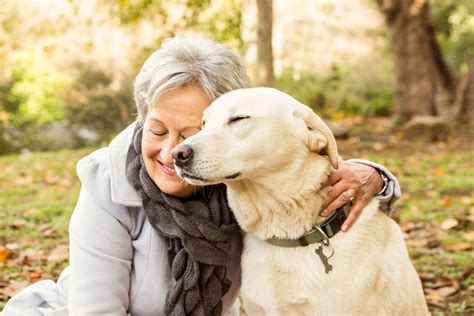Discover the best dog breeds for seniors, low energy, small size, and gentle temperament. Find the perfect therapy and emotional support dog with our helpful guide.
Considerations for Seniors
As our loved ones age, it’s important to consider their unique needs when choosing a companion pet. Seniors may require a dog that is low energy, easy to care for, and gentle in temperament. It’s also important to consider factors like the size of the dog and whether they will be suitable for therapy and emotional support.
When selecting a dog for a senior, it’s crucial to focus on low energy breeds that don’t require a lot of exercise. This is particularly important for seniors who may have limited mobility or health issues. Low energy breeds such as Bichon Frise, Cavalier King Charles Spaniel, and Pug are all great options for seniors who may not be able to keep up with a more active dog.
Additionally, gentle temperament dogs are ideal for seniors as they tend to be more patient and easygoing. Breeds such as Labrador Retrievers, Golden Retrievers, and Basset Hounds are known for their friendly and gentle nature, making them wonderful companions for older adults. It’s important to choose a dog that will be calm and loving, especially if the senior has limited physical abilities.
Low Energy Breeds
Low Energy Breeds
Low energy breeds are the perfect choice for individuals or families looking for a calm and relaxed pet. These dogs are known for their laid-back nature and are often content with just a daily walk or some light playtime. They are ideal for seniors who may not have the energy to keep up with a high-energy dog. Low energy breeds can also be a great choice for individuals living in apartments or small living spaces.
Some popular low energy breeds include the Bulldog, Shih Tzu, and Basset Hound. These dogs may not require as much exercise as other breeds, but it’s important to note that they still need daily physical activity to stay healthy. Regular walks and interactive playtime are essential to prevent obesity and maintain their overall well-being.
When choosing a low energy breed, it’s important to consider their grooming needs as well. Some breeds may have long or dense coats that require regular grooming to prevent matting and tangles. Additionally, it’s important to consider their overall temperament and compatibility with your lifestyle. Whether you’re a senior looking for a companion pet or simply prefer a more laid-back dog, low energy breeds can make wonderful additions to your family.
Small Size Dogs
When considering getting a new pet, many people look for a small size dog that will fit well into their home and lifestyle. Small size dogs are often preferred for their adaptability to apartment living and easy maintenance. Whether you are a senior looking for a companion pet or someone with a small living space, there are plenty of small size dog breeds to choose from.
Small size dogs, also known as toy breeds, are typically under 20 pounds and can be easily carried and transported. They are known for their affectionate nature and make great lap dogs. Popular small size dog breeds include the Chihuahua, Pomeranian, Maltese, and Shih Tzu, among others. These breeds are known for their charm and playful personalities, making them excellent pets for families and individuals alike.
When it comes to training and grooming, small size dogs are often low maintenance, making them an ideal choice for many pet owners. They tend to require less exercise and are easier to handle, especially for older adults. Additionally, small size dogs are known for their longevity, with many breeds living well into their teenage years, providing years of companionship and love for their owners.
Gentle Temperament Dogs
When it comes to choosing a dog with a gentle temperament, there are several breeds that come to mind. These dogs are known for their calm and easygoing nature, making them great companions for older adults. One such breed is the Golden Retriever, known for its friendly and loving personality. Golden Retrievers are loyal and affectionate, making them perfect for seniors looking for a loving and gentle companion.
Another gentle breed is the Cavalier King Charles Spaniel. These dogs are known for their gentle and affectionate nature, and they are great with children and other pets. Their easygoing temperament makes them an ideal choice for seniors looking for a friendly and low-maintenance pet.
Additionally, the Bichon Frise is also a gentle and playful breed that is known for its loving and affectionate nature. These dogs are great for seniors who are looking for a small, gentle, and hypoallergenic companion. With their friendly and affectionate personality, they can bring joy and comfort to older adults looking for a loyal and gentle companion.
Low Maintenance Breeds
Low Maintenance Breeds
When it comes to choosing a dog that requires minimal grooming and upkeep, there are several breeds that are perfect for those seeking low maintenance pets. These dogs are great for seniors or anyone who doesn’t have the time or energy to devote to extensive grooming and care.
One popular low maintenance breed is the Chihuahua, known for its small size and short coat. These dogs require minimal grooming and are well suited for living in small spaces, making them a great option for apartment dwellers or seniors living in retirement communities.
Another low maintenance breed is the Boston Terrier, which has a short, easy-to-care-for coat and a friendly, adaptable personality. These dogs are easy to train and make great companions for seniors looking for a low-key pet that doesn’t require a lot of upkeep.
Therapy and Emotional Support Dogs
Therapy and Emotional Support Dogs
Therapy dogs are specially trained to provide comfort and support to individuals in hospitals, nursing homes, schools, and other settings. They offer emotional support and companionship to those in need, and can help reduce stress and anxiety. These dogs are often used in animal-assisted therapy programs to improve the mental and physical well-being of people with various health conditions.
Emotional support dogs, on the other hand, are not trained for specific tasks but provide comfort and companionship for individuals with emotional or psychological disabilities. They are often prescribed by mental health professionals to help their owners cope with symptoms of anxiety, depression, and other mental health issues. These dogs can provide a sense of security and routine, and help their owners feel less isolated.
Whether it’s a therapy dog providing comfort to hospital patients or an emotional support dog offering companionship to someone struggling with anxiety, these special dogs play a vital role in improving the well-being of their human counterparts. Their gentle and loving nature makes them ideal companions for individuals in need of emotional support, and their presence can have a profound impact on the lives of those they interact with.
Choosing the Right Breed
When it comes to choosing the right breed of dog for your lifestyle, there are a few important factors to consider. Size, energy level, and temperament are all crucial aspects to think about when deciding on a dog. If you live in a small apartment, a large, high-energy breed might not be the best fit for your home. On the other hand, if you enjoy spending time outdoors and leading an active lifestyle, a small, low-energy breed might not be the best match for you. It’s important to consider your own lifestyle and living situation when choosing the right breed.
Another important consideration when choosing the right breed is whether or not you have allergies. Some breeds are known to be hypoallergenic, meaning they produce fewer allergens and are less likely to trigger allergy symptoms in humans. If you or a family member suffers from allergies, it’s crucial to choose a breed that is compatible with your allergy needs.
Finally, it’s important to think about what kind of relationship you want to have with your dog. Are you looking for a loyal, protective companion? Or do you want a dog that is more independent and low-maintenance? Different breeds have different temperaments and personality traits, so it’s important to consider what kind of relationship you want to have with your dog before deciding on the right breed for you.
Frequently Asked Questions
What are some important considerations when choosing a dog for seniors?
When choosing a dog for seniors, it’s important to consider the size, activity level, and temperament of the dog. Seniors may prefer a smaller, lower-energy breed that is easy to handle.
What are some dog breeds that are known for being good companions for seniors?
Some dog breeds that are known for being good companions for seniors include the Cavalier King Charles Spaniel, Pug, Shih Tzu, and Maltese. These breeds are often small, affectionate, and relatively low-energy.
Why are smaller dogs often recommended for seniors?
Smaller dogs are often recommended for seniors because they are easier to handle, require less exercise, and are generally more suitable for apartment or smaller living spaces.
Are there any considerations for older adults with mobility issues when choosing a dog?
For older adults with mobility issues, it’s important to choose a dog that is easy to manage, such as a smaller breed with a calm demeanor. Training and grooming requirements should also be taken into consideration.
What are some benefits of having a dog for seniors?
Having a dog can provide companionship, encourage physical activity, and offer a sense of purpose and routine for seniors. Dogs can also help reduce stress and anxiety, and provide a source of social interaction.
What are some potential drawbacks of owning a dog for seniors?
Some potential drawbacks of owning a dog for seniors include the responsibility of daily care, potential costs for food and veterinary care, and the need for regular exercise and walks.
How can seniors ensure they are prepared for the responsibility of owning a dog?
Seniors can prepare for the responsibility of owning a dog by researching different breeds, considering their own lifestyle and needs, and ensuring they have the time, energy, and resources to properly care for a pet.





